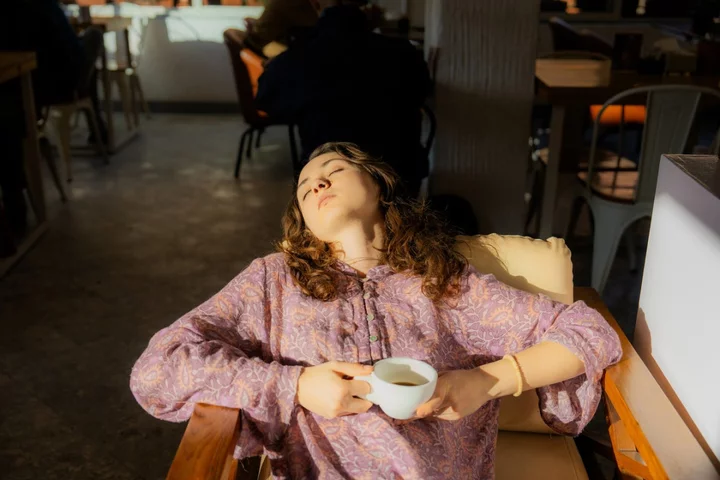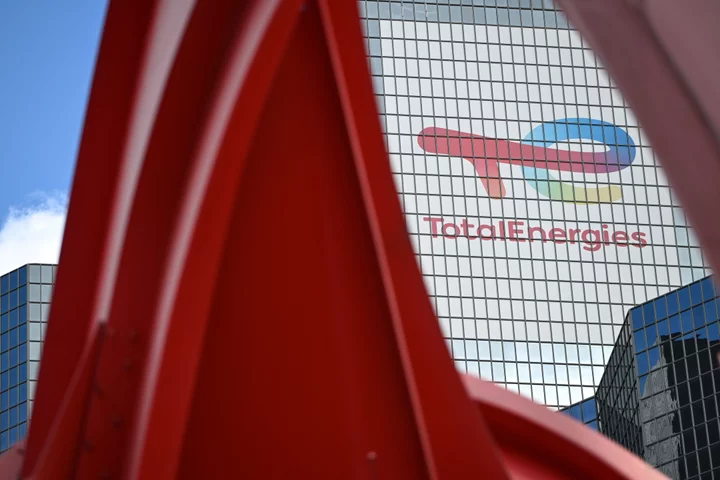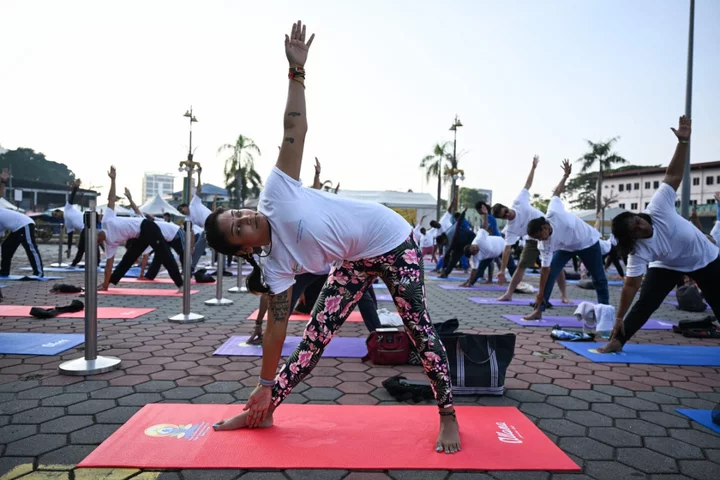
Howard Donald felt pressure as 'weakest writer' in Take That
Take That star Howard Donald feels like the "weakest writer" in the group and he was determined to step up.
2023-11-14 16:28

Denzel Washington to reunite with Antoine Fuqua for Hannibal epic
Hollywood legend Denzel Washington will reunite with his 'Training Day' director Antoine Fuqua to portray Hannibal in a new Netflix film.
2023-11-14 16:15

Why Wendy's Quietly Got Rid of Its Elegant Sunrooms
Solariums are nostalgic for many customers, but Wendy's thinks they’re dated.
2023-11-14 00:27

Top 10 hacks to beat the afternoon slump
An expert has revealed how to beat the afternoon slump, including chewing gum, having a ginger shot – and watching cute cat videos. Nutritionist and mental health advocate Rosie Millen, has revealed the top 10 hacks to get yourself out of the energy lull, which also includes grabbing a colouring in book, making a ‘slump’ playlist and spraying your favourite perfume. According to Rosie, watching heart-warming videos of cats can have a huge impact on your mood and energy levels, and also decreases stress. While studies show that simply chewing gum increases blood flow to the brain, which then makes you more alert. And drinking a shot of ginger – which is a natural energy booster – can also help you out of a slump. It comes after a study of 2,000 adults found they suffer an average of three energy slumps a day, with 2.36pm the most common time to hit the wall. But 49 per cent admitted they have no idea how to avoid the energy loss. ‘Lack of sleep was found to be the top cause of an energy slump’ Rosie, who is working with Vitabiotics Feroglobin in a bid to help people cope with the dreaded afternoon slump, said: “We’ve all been there. Some of us more than others. And when it hits, it hits hard. “We all know the obvious solutions on hand – exercise, have a cup coffee or take a nap. “But what are some of the more unconventional hacks at our fingertips that can also help bring you out of your energy lull and allow you to get on with your day.” Following the findings, a quiz has also been created to allow you to test how at risk of a slump you are, and whether you need to work to boost your energy levels. A lack of sleep was found to be the top cause of an energy slump for 45 per cent, followed by not drinking enough water (25 per cent), not exercising (22 per cent) and not having the right foods (21 per cent). But 19 per cent blamed it on having to complete a boring activity while 12 per cent suffer a slump when they are in a meeting that goes on for too long. Worryingly, 34 per cent have even had an energy slump while driving. As the result of the lull in their energy levels, 21 per cent have cried and 19 per cent have argued with their partner. Others admitted to cancelling a social engagement (19 per cent), forgetting they were meant to be somewhere (16 per cent) or shouting at their children (15 per cent). While 12 per cent have even fallen asleep in a meeting and 10 per cent have made a mistake at work. But in a bid to beat the slump, 37 per cent have turned to coffee while the same percentage has tried going for a walk outside. Three in 10 consume sugary snacks, 26 per cent splash their face with water and 12 per cent put some loud music on. It also emerged the average adult complains of feeling tired three times a day, with 39 per cent admitting their lack of energy is often a topic of conversation with friends. However, a quarter of those who suffer with energy slumps, polled via OnePoll, have been so concerned, they have visited a doctor or medical professional. To try and boost their energy levels and avoid a slump, 38 per cent have attempted to improve their sleeping pattern while 36 per cent have done more exercise. Others have changed their diet (30 per cent), taken supplements (30 per cent) or taken more breaks throughout the day (26 per cent). A spokesperson for Vitabiotics Feroglobin said: “We’ve all experienced an energy slump – and when it hits, it can be really hard to get out of it. “But as well as learning how to beat it, it’s important to learn how to avoid the slump in the first place. “Your diet and nutrition can have a huge impact on your energy levels, so making sure you are eating the right foods and getting the vitamins and minerals you need can go a long way to beating the slump.” Here are some top tips to beat the slump: 1) Watch cute cat videos Believe it or not, watching cat videos can have a profound effect on your mood and energy levels. A study from the Indiana University Media School of 7,000 people found that watching cat videos not only improves your mood but also decreases stress and re-energises you for when you return to your work. 2) Eat an iron rich snack You need iron to carry oxygen to the muscles and organs in the body. When iron levels are low, this can contribute to fatigue. So make sure you get some iron rich snacks every day to keep your levels up. Good recommendations include dried fruit and pumpkin seeds, dark chocolate and houmous with chopped veg. 3) Chew gum This semi-strange tip actually has science to back it up. A study from the journal of physiology and behaviour found that chewing gum increases blood flow to the brain which in turn improves alertness. 4) Grab a colouring in book Not only does colouring in alleviate stress and reduce anxiety it is like a full brain workout for your neurologic system. While colouring, you use the parts of your brain (the frontal lobe) that enhances focus and concentration. Certain colours, such as yellow and orange, are also thought to increase energy. 5) Jump into an ice bath or have a very cold shower Experts say that cold showers boost the immune system and increase energy levels. Scientists believe it improves circulation and blood flow to and from the muscles. It is also thought to improve your mood. A 2008 study found that the use of cold showers on a daily basis decreases depressive symptoms. 6) Make a playlist Music has an incredible impact on our mood and can absolutely transform your energy levels even in a short space of time. Just popping in your earphones and blasting your favourite song alters brainwaves and improves cognitive performance. New research from the British Academy of Sound Therapy found that after listening to music for just nine minutes, 65 per cent of test subjects reported they were happier and laughed more, 89 per cent had improved energy levels and 82 per cent felt more in control of their lives. So, get a playlist ready before you start to crash. 7) Turn up the lights If you’re feeling slumped turn up the lights in your house. The high colour temperature of bright and cool lights triggers the release of serotonin, which makes us more alert and energetic. Results of a study with 52 test subjects showed that people felt more alert and energized after having been exposed to bright light. Stepping out into the sunshine is also a gamechanger. The effects of vitamin D and energy are well documented. Fatigue is one of the main symptoms of vitamin D deficiency. 8) Spray your favourite perfume A lot of clinical research supports claims that certain essential oils increase energy and relieve fatigue. Peppermint oil, for example, is effective for preventing fatigue and improving exercise performance. And eucalyptus is thought to awaken the mind and increase mental clarity. You can either inhale essential oils directly, spray a perfume with them in, add a few drops to your shampoo or opt for an energising massage (time and finances permitting). 9) Call a friend Unsurprisingly, socialising with friends can be really lifting. Dopamine and oxytocin are released when you socialize which in turn boosts your mood, reduces cortisol levels and lowers stress. In fact, social isolation has more far-reaching negative effects. New research suggests that being alone for too long is comparable to smoking up to 15 cigarettes a day. 10) Have a ginger shot Ginger is a natural energy booster and may be able to give you the kick you are looking for mid-afternoon. Studies suggest it has stimulatory effects. Just make sure you go for as fresh as possible without any added sugar. Read More What are the symptoms of Parkinson's disease and how can it be treated? What is silent reflux? Yoga may reduce seizure frequency in epilepsy patients, scientists say Yoga may reduce seizure frequency in epilepsy patients, scientists say Jonnie Irwin says he ‘never thought’ he’d be alive to see his 50th birthday Billy Connolly shares health update on Parkinson’s disease: ‘Every day gets stranger’
2023-11-14 00:18

Dua Lipa says Tame Impala's Currents 'completely changed' her life
Dua Lipa has been "obsessed" with Tame Impala for several years now.
2023-11-13 19:59

Chrissy Teigen laughs off revealing wardrobe malfunction
Chrissy Teigen was left red-faced after her dress split open at the Baby2Baby Gala.
2023-11-13 19:19

Zac Efron says getting real-life wrestler Kevin Von Erich’s blessing for ‘The Iron Claw’ was his ‘most important review’
After undergoing a shock transformation to play the fighter, Zac Efron has admitted getting real-life wrestler Kevin Von Erich’s blessing for ‘The Iron Claw’ was the “most important review” he could get for the biopic.
2023-11-13 18:23

First Starship Passenger Makes New Plans While Waiting for Musk
As Elon Musk prepares to test his Starship rocket for the first time since an April takeoff ended
2023-11-13 18:23

Adam Driver shocks fans by telling audience member ‘F*** you’ after they branded ‘Ferrari’ action scenes ‘cheesy’
After the movie was hit by a wave of negative reviews, Adam Driver stunned an audience at a paid-for question and answer session about his ‘Ferrari’ film by saying “f*** you” to an audience member who called crash scenes in the movie cringeworthy.
2023-11-13 18:21

TotalEnergies to Buy Gas Power Plants in Texas for $635 Million
TotalEnergies SE agreed to buy three natural gas-fired power plants in Texas from TexGen Power LLC for $635
2023-11-13 15:52

Yoga may reduce seizure frequency in epilepsy patients, scientists claim
Doing yoga may help reduce frequency of seizures in people with epilepsy and lower their anxiety, a new study found. The practice may also improve patients’ overall quality of life by reducing the stigma they feel from having the disease, according to the research, published last week in the medical journal Neurology. “People with epilepsy often face stigma that can cause them to feel different than others due to their own health condition and that can have a significant impact on their quality of life,” study author Manjari Tripathi from All India Institute of Medical Sciences (AIIMS) in New Delhi said. “This stigma can affect a person’s life in many ways including treatment, emergency department visits and poor mental health,” Dr Tripathi explained. In the study, researchers assessed people with epilepsy with an average age of 30 in India. They measured stigma among participants based on their answers to questions such as: “Do you feel other people discriminate against you?” “Do you feel you cannot contribute anything in society?” and “Do you feel different from other people?” About 160 people who met the criteria for experiencing stigma were then identified. These patients had an average of one seizure per week and on average took at least two anti-seizure medications, researchers said. One set of patients were then randomly assigned to receive yoga therapy, which included exercises in loosening muscles, breathing, meditation and positive affirmations. Another set of patients received a sham therapy that mimicked the same exercises, but these participants were not given instructions on two key components of yoga – slow and synchronized breathing, and attention to the body movements and sensations. Both the groups received seven supervised group sessions of 45 to 60 minutes over three months. They were also asked to practice sessions at home at least five times a week for 30 minutes and track their seizures and yoga sessions in a journal. Participants were then followed for an additional three months after their first three months of therapy. People who did yoga were more than four times as likely to have their seizure frequency more than halved after six months than the people who did sham yoga, the study found. Compared to those who did the sham practice, participants who did yoga were more likely to reduce their perceived stigma of the disease, researchers say. People who did yoga were also over seven times more likely to no longer have seizures than those who did the sham practice, according to the study. Researchers also reported a significant decrease in anxiety symptoms among those who did yoga versus people who did not. “The intervention group showed significant improvement in symptoms of anxiety, cognitive impairment, mindfulness and quality of life relative to the control group at the end of follow-up period,” researchers wrote. “Yoga may not only help reduce stigma, but also improve quality of life and mindfulness. Plus, yoga can be easily prerecorded and shared with patients online using minimal resources and costs,” Dr Tripathi said. Citing the main limitation of the study, researchers said the participants self-reported their seizure frequency and they may not have remembered all the information accurately. However, they say the findings “elevate the need to consider alternative therapies and activities for people with epilepsy facing stigma”. Read More Jonnie Irwin says he ‘never thought’ he’d be alive to see his 50th birthday Billy Connolly shares health update on Parkinson’s disease: ‘Every day gets stranger’ What are the symptoms of Parkinson's disease and how can it be treated? Jonnie Irwin says he ‘never thought’ he’d be alive to see his 50th birthday Billy Connolly shares health update on Parkinson’s disease: ‘Every day gets stranger’ What are the symptoms of Parkinson's disease and how can it be treated?
2023-11-13 12:55

China’s Carbon Emissions to Drop Next Year on Clean Energy Boom
A surge in clean power generation will reduce carbon emissions in China next year and could put the
2023-11-13 09:47
